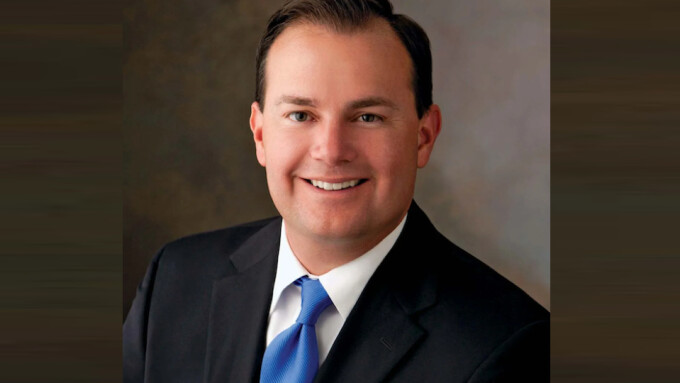WASHINGTON and SALT LAKE CITY — Sen. Mike Lee (R-Utah) this week introduced the Interstate Obscenity Definition Act (IODA), a bill that nominally aims to “establish a national definition of obscenity” but which would, in effect, outlaw all online sexual content nationwide.
The United States does not currently have a national definition of obscenity. Jurisprudence has established the Miller Test, which has been a legal standard in federal courts for a half-century. According to a statement from Lee’s office, however, the Utah senator believes that it is time to codify those standards, set in 1973, under which the production and distribution of sexual content have been legal in the United States.
According to Lee, “The Supreme Court has struggled to define obscenity, and its current definition under the ‘Miller Test’ runs into serious challenges when applied to the internet.”
Echoing the language of fellow Utahn and Mormon Republican activist Dawn Hawkins, CEO of powerful anti-porn lobby NCOSE, Lee's bill “would define ‘obscenity’ within the Communications Act of 1934. Additionally, it would also strengthen the existing prohibition on obscenity by removing the ‘intent’ requirement,” which only prohibits the transmission of obscenity to abuse, threaten or harass someone.
Lee is essentially arguing that a 1973 precedent should be updated for the internet age by revising a law from 1934, adopted long before even the mainstream adoption of television.
Lee is a member of the Church of Jesus Christ of Latter-day Saints, which, as XBIZ reported, sees sexual content as a ploy by Satan to destroy Mormon households by tempting Mormon men.
Lee's Proposed Criminalization of Porn
Lee’s office posted a one-page summary of the IODA, stating that “Obscenity is not protected speech under the First Amendment and is prohibited from interstate or foreign transmission under U.S. law,” calling obscenity “difficult to define (let alone prosecute) under the current Supreme Court test for obscenity: the ‘Miller Test’” and promising that the IODA will “establish a national definition of obscenity that would apply to obscene content that is transmitted via interstate or foreign communications.”
Lee's proposed redefinition of “obscenity” would eliminate Miller Test references to “contemporary community standards” and “applicable state law,” instead defining obscene content as any material that “(i) taken as a whole, appeals to the prurient interest in nudity, sex, or excretion, (ii) depicts, describes or represents actual or simulated sexual acts with the objective intent to arouse, titillate, or gratify the sexual desires of a person, and, (iii) taken as a whole, lacks serious literary, artistic, political, or scientific value.”
Industry attorney Corey Silverstein, of MyAdultAttorney.com and Adult.law., told XBIZ that Lee “is correct that obscenity is ‘difficult to define,’” and even believes that exchanging “contemporary community standards” for a national standard “is not necessarily a bad idea.” He notes, however, that “where Senator Lee goes wrong is that his bill does not specifically call for a nationwide standard. Senator Lee appears to be attempting to change Miller vs. California and in essence overrule it — which in my opinion is unconstitutional.”
If the IODA succeeds, and sexual content loses the free-speech protections that have stood for the last 50 years, that would open the door for the government to prosecute every creator or distributor of adult content.








